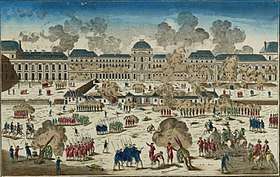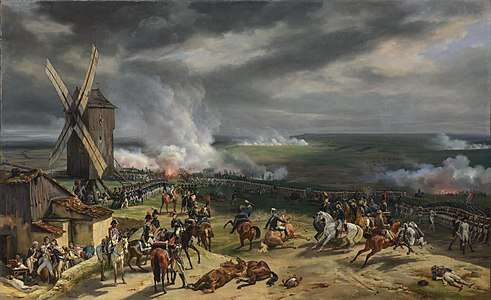1792 in France
| |||||
| Decades: |
| ||||
|---|---|---|---|---|---|
| See also: | Other events of 1792 History of France • Timeline • Years | ||||
Events from the year 1792 in France.
Incumbents
- Monarch: Louis XVI (until 21 September; monarchy abolished)
- The Legislative Assembly (until 21 September)
- The National Convention (from 21 September)
Events
April
- 20 April – The National Assembly declares war against Austria, starting the French Revolutionary Wars.
- 25 April
- Highwayman Nicolas Pelletier becomes the first person executed by guillotine in France.
- La Marseillaise, the French national anthem, is composed by Claude Joseph Rouget de Lisle.
June
- 20 June – Demonstration of 20 June 1792

Storming of the Tuileries in August
(musée de la Révolution française).
(musée de la Révolution française).
August
- 10 August – French Revolution: The Tuileries Palace is stormed, and Louis XVI of France is arrested and taken into custody.
- 20 August – Battle of Verdun
September
- 2–19 September – 1792 French National Convention election
- 2–7 September – French Revolution – September Massacres: Rampaging mobs slaughter three Roman Catholic bishops and more than 200 priests, together with at least 1,000 criminals.
- 9 September – 9 September massacres
- 11 September – Six men steal some of the former French Crown Jewels from a warehouse, where the revolutionary government had stored them.
- 14 September – Thomas Paine flees from England to France, after being indicted for treason. He is tried in absentia during December and outlawed.[1]
- 20 September - French Revolution - Battle of Valmy: The French revolutionary army defeats the Prussians under the Duke of Brunswick, after a 7-hour artillery duel.
- 21 September – French Revolution: A Proclamation of the abolition of the monarchy by the French Convention goes into effect, and the French First Republic is established, effective the following day.
- 22 September – French Revolution: The Era of the historical French Republican Calendar begins.
November
- 6 November – At the Battle of Jemappes, Austrian armies under the command of Duke Albert of Saxe-Teschen, are defeated in Belgium (at the time, part of the Austrian Netherlands) by the French Army, led by General Charles François Dumouriez.[2]
- 19 November – France's National Convention passes a resolution pledging French support for the overthrow of the governments of other nations.[3]
December
- 26 December – The trial of Louis XVI of France begins.
Full date unknown
- Barthélemy Catherine Joubert, future general, becomes sub-lieutenant.
Births
- 21 May – Gaspard-Gustave Coriolis, engineer, scientist
- 25 August – Jean-Baptiste Duvergier
- 28 November – Victor Cousin, philosopher
Deaths
- 1 March – Jean Godin des Odonais, cartographer and naturalist
- 12 May – Charles Simon Favart, dramatist
- 29 July – René Nicolas Charles Augustin de Maupeou, Chancellor of France
- 23 August – Arnaud II de La Porte
- 25 August – Jacques Cazotte, writer (executed)
- 3 September – Marie Thérèse Louise of Savoy, Princesse de Lamballe, princess, courtier to Marie Antoinette (murdered during the French Revolution)
- 8 September – Charles d'Abancour, statesman
- 22 October – Guillaume Le Gentil, astronomer
gollark: ++help tel
gollark: <@356107472269869058>
gollark: Did NOBODY notice the acronym issue?
gollark: Maybe it doesn't like parsing your form somehow.
gollark: Odd.
See also
References
- Palmer, Alan; Veronica (1992). The Chronology of British History. London: Century Ltd. pp. 232–233. ISBN 978-0-7126-5616-0.
- Eric J. Evans, The Forging of the Modern State: Early Industrial Britain, 1783–1870 (Routledge, 2014)
- Robert Bisset, The Reign of George III: To which is Prefixed a View of the Progressive Improvements of England in Property and Strength to the Accession of His Majesty, Volume 2 (Edward Parker, 1822) p855
This article is issued from Wikipedia. The text is licensed under Creative Commons - Attribution - Sharealike. Additional terms may apply for the media files.
.svg.png)

.jpg)